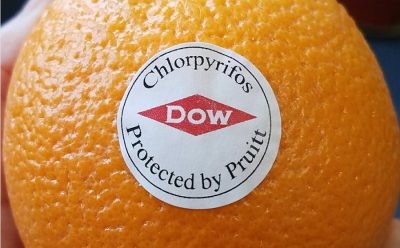
Enquiry Requested on Reversal of Proposed Dow Pesticide Ban
After the extraordinary decision by the new head of the US Environmental Protection Agency, Donald Trump appointee Scott Pruitt, to reverse the proposed ban on the pesticide chlorpyrifos, an enquiry has been requested by Congressional Democrats.1
A letter, sent to the office of the Inspector General at the EPA by Senator Elizabeth Warren (D-MA) and Representative Frank Pallone (D-NJ), states that Administrator Pruitt’s reversal of the decision to ban chlorpyrifos: “appears not to be based on EPA’s existing recent scientific findings about the risk, or any new information that contradicts the findings about the health and safety risks of chlorpyrifos…. It does not appear to be consistent with the law, which requires that pesticide products cannot be used unless ‘there is reasonable certainty that no harm will result from the aggregate exposure to the pesticide chemical residue.’”
But, perhaps more telling, is that the letter goes on to intimate that commercial interests may have played a part in Pruitt’s decision: “his order indicates that Administrator Pruitt based his decision on at least one factor- that chlorpyrifos is ‘widely used’ – that is not included in the law.”
The letter asks: “How did Mr. Pruitt reach the decision he announced on March 29, 2017? What was the timeline leading up to this decision? With whom did he communicate within EPA, the White House, or elsewhere in the Administration? With which outside entities did he communicate? Specifically, did Mr. Pruitt have any communication with staff or representatives of Dow Chemical or any pesticide industry trade groups including CropLife America?”
The letter’s final question suggests that, under the new administration, the EPA may now be dealing in ‘alternative facts’ when it asks: “Is the EPA accurately and transparently presenting information to the public with regard to previous EPA actions concerning chlorpyrifos? For example, the EPA website for chlorpyrifos on January 2, 2017 contained information indicating that EPA “proposed to revoke all chlorpyrifos tolerances,” and contained a link with detailed information about the health risks and the reasons for the EPA action. This reference to the proposed ban, and the link to the detailed EPA analysis are no longer available on the chlorpyrifos web page, and the link to the analysis (as of April 3, 201 7) now gives a “Page Not Found” error.”
As if the dismantling of the EPA’s work, from within, wasn’t enough, a new bill just passed by the US House of Representatives will suffocate new policies if it becomes law. The so-called ‘HONEST’ Act2 “prohibits the EPA from proposing, finalizing, or disseminating regulations or assessments based upon science that is not publicly available.”
According to the Chair of the House Science Committee who sponsored the bill, a Republican from Texas, Lamar Smith: “The HONEST Act requires EPA to base new regulations on sound science that is publicly available, and not hidden from the American people,”
But, an article in the New Scientist3 explains how the act might not be as honest as its moniker suggests: “While this may sound like a laudable move towards increased transparency, it would actually hobble the agency’s ability to develop good, science-based public health regulations, says Andrew Rosenberg, director of the Union of Concerned Scientists’ Center for Science and Democracy. “It’s couched in terms of transparency, but is actually one of several actions intended to bring regulations to a halt,” he says.”
New Scientist goes on to explain that the implications of making all the science behind any given policy ‘available to the American people’ are that, in some situations, this can mean breaching confidentialities and, thus, rendering the policy unworkable.
An article in the National Law Review describes how the Trump administration twists meaning in the service of its commerce-driven agenda: “The EPA press release captures this, quoting Administrator Pruitt stating (in part) ‘By reversing the previous Administration’s steps to ban one of the most widely used pesticides in the world, we are returning to using sound science in decision-making — rather than predetermined results.’”
“The science debate will rage on, with no clear timeline or process for how the ultimate resolution of these questions will be “final.” This political and legal back-and-forth may become the new normal for the Trump Administration as it seeks to balance a more “business friendly” regulatory approach with the stringent requirements of the statutory duties of underlying authorizing legislation across all of EPA’s programs.”
1: ‘Dow Chemical Wants Farmers to Keep Using a Pesticide Linked to Autism and ADHD.’ CLICK
2: The HONEST Act CLICK
3: US bill restricts use of science in environmental policy making CLICK
4: ‘EPA Denies Petition to Ban Chlorpyrifos’ CLICK


